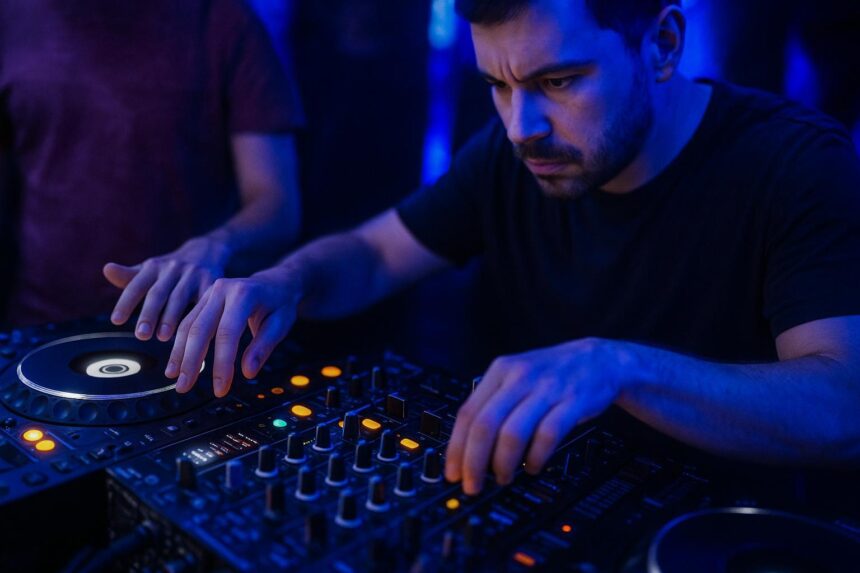A quiet crisis on the dance floor
Walk into a Brazzaville nightclub this weekend and chances are the speakers will blast Nigerian afro-beat or Kinshasa’s latest soukous anthem. Local observers note that Congolese titles claim barely a quarter of prime-time sets, a far cry from the 1990s golden age.
Promoters read the shift in cold numbers: fewer Congolese songs enter regional charts, streaming playlists, or TV rotations. The Ministry of Culture’s 2023 barometer counted only three nationally produced singles in the Top 50 of Central African radio—a statistic that startled veteran musicians.
Congolese DJs under the spotlight
Because they work at the frontline of nightlife, DJs are natural gatekeepers between studios and the public. Their selections influence weddings, bars, taxi radios and even viral TikTok challenges. When the cue button lights up, they decide which beat defines the party moment.
Most professionals insist they are not biased, only pragmatic. “Crowds want hooks they already know,” explains DJ Kévin Mavoungou, resident at La Citadelle Club. “If I mix in an unfamiliar track and people leave the floor, the owner loses sales.” That economic pressure nudges them toward proven international smashes.
Urban stars break through
Paradoxically, Congolese urban music is booming online. Singers such as Tidiane Mario and Diesel Gucci rack up millions of YouTube views, and Sam Samouraï’s single ‘Mboka’ recently featured on Trace TV’s Africa 10 chart. Streaming platforms have opened new lanes for self-promotion.
These digital victories rarely translate inside clubs beyond Brazzaville’s youthful districts. Event organisers confirm that unless a track already trends abroad, some DJs hesitate to risk it, fearing quieter dance floors. As a result, local artists watch their hometown audiences discover them last.
Diaspora dance floors favour imports
The imbalance grows sharper in Paris, Pointe-Noire or Libreville, where many Congolese expatriates celebrate Friday nights. Observers say playlists there lean up to 80 % toward foreign catalogs, especially Nigeria’s Afro-fusion giants. Distance, not dislike, seems to drive the gap.
“Our DJs rely on global pools that rarely carry Brazzaville releases,” notes Léa Ngatsé, a promoter of AfroMix London. “When they do find them, metadata is missing, so the songs appear amateurish next to slick Nigerian files.” Without local partnerships, the diaspora stage remains dominated by outsiders.
Historical echoes and new releases
Veteran bands remember another era. In the 1980s, titles by Pamélo Mounka or Théo-Blaise Kounkou crossed borders within days, helped by touring orchestras, radio exchanges and cassette traders. That network has thinned, yet the creative spark endures.
Patrouille des Stars just released ‘Ligne Rouge’, a ten-track rumba album praised by critics for its layered guitars. Cedro La Loi’s tribute ‘Nzéla ya Ébendé’ fuels thousands of TikTok clips. Still, several Brazzaville DJs confess they have not downloaded either project, citing tight schedules and lack of promotional mailings.
Why local sounds stay off playlists
Analysts highlight three hurdles. First, marketing budgets remain modest: labels struggle to push singles beyond social media. Second, technical standards differ; many songs arrive without radio edits or high-resolution stems required by modern mixers. Third, royalties management remains complex, reducing incentives for clubs to log Congolese tracks.
The consequence is a feedback loop. Lower airplay shrinks fan bases, which in turn discourages investors and leaves DJs with few surefire crowd-pleasers. Meanwhile, foreign catalogs keep feeding the system with professional press kits, remixes and promotional drops tailored for club formats.
Ideas to reboot the rotation
Solutions are emerging. Cultural agencies propose monthly DJ-artist meet-ups where producers preview unreleased tracks and share promotional flash drives. The national radio observatory plans to publish a public pool of broadcast-ready Congolese singles in multiple formats.
Some DJs already lead the change. In Oyo, DJ Léo Mboungou dedicates one set per night to local exclusives and posts the playlist on Instagram. “At first, people were curious. Now they request those songs by name,” he reports. Streaming numbers of featured artists reportedly spiked 30 % after a single weekend residency.
Shared responsibility, shared reward
DJs, labels, media and public authorities all hold pieces of the same puzzle. By coordinating calendars, standardising audio quality and rewarding airplay transparency, stakeholders could restore Congolese music to its rightful place on regional dance floors.
The job is not about rejecting foreign rhythms; it is about giving hometown talents an equal chance to shine. Every time a crowd discovers a new local hook, the entire ecosystem—from street vendors selling data bundles to studios hiring session musicians—wins a little more.
With rumba’s UNESCO heritage badge and a rising urban scene, the Republic of Congo owns a rich soundtrack. The next step is simple: press play, louder, on our own songs. Clubs will still overflow; only the accent of the chorus will change.





















